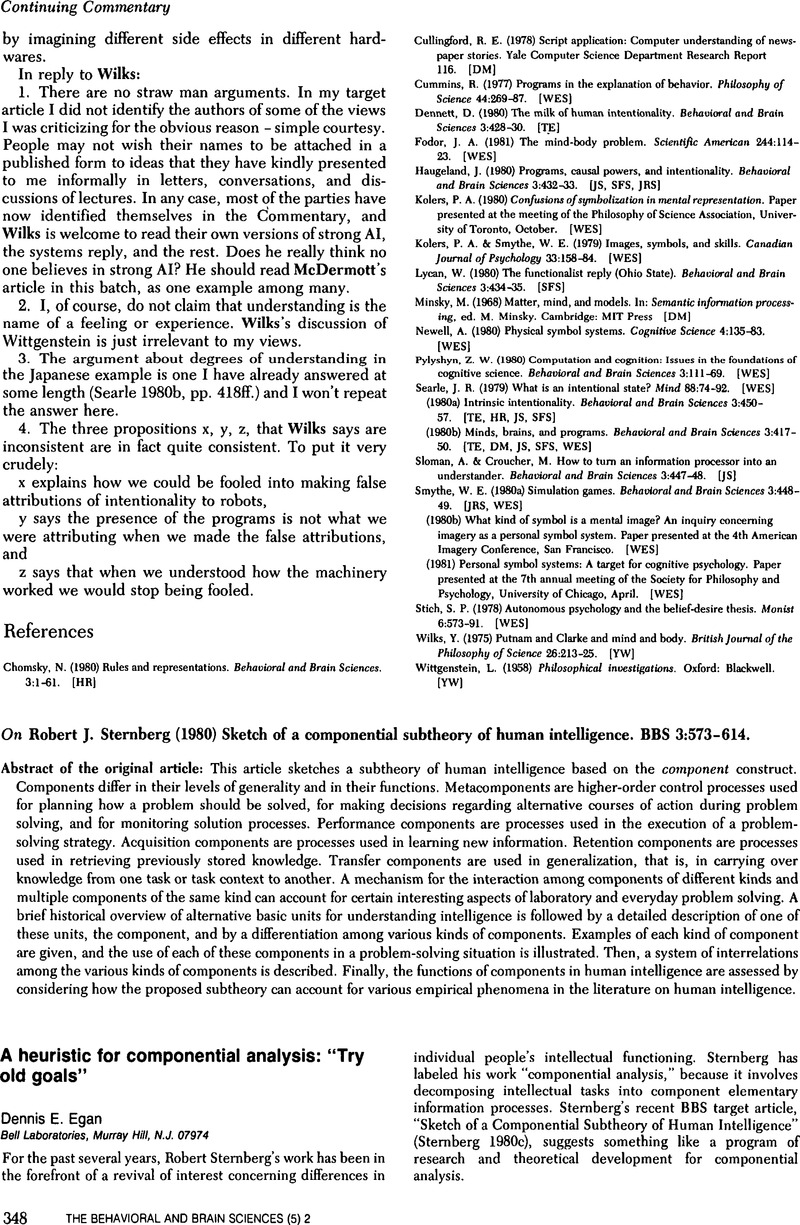No CrossRef data available.
Article contents
Componential analysis and componential theory
Published online by Cambridge University Press: 04 February 2010
Abstract
An abstract is not available for this content so a preview has been provided. Please use the Get access link above for information on how to access this content.

- Type
- Author's Response
- Information
- Behavioral and Brain Sciences , Volume 5 , Issue 2: Special Symposium Issue , June 1982 , pp. 350 - 351
- Copyright
- Copyright © Cambridge University Press 1982
References
Cronbuch, L. J. (1957) The two disciplines of scientific psychology. American Psychologist 12:671–84. [DEE]CrossRefGoogle Scholar
Cronbach, L. J. & Snow, R. E. (1977) Aptitudes and instructional methods. New York: John Wiley & Sons. [DEE]Google Scholar
Egan, D. E. (1978) Characterizing spatial ability: Different mental processes reflected in accuracy and latency scores. Research Report no. 1250. Pensacola, Fla.: Naval Aerospace Medical Research Laboratory. [DEE]CrossRefGoogle Scholar
Egan, D. E. (1979) Testing based on understanding: Implications from the study of spatial ability. Intelligence 3:1–15. [DEE, RJS]CrossRefGoogle Scholar
Ernst, C. W. & Newell, A. (1969) GPS: A case study in generality and problem soloing. New York: Academic Press. [DEE]Google Scholar
Cuyote, M. J. & Sternberg, R. J. (1981) A transitive-chain theory of syllogistic reasoning. Cognitive Psychology 13:461–525. [RJS]Google Scholar
Hunt, E. B.; Frost, N. & Lunneborg, C. (1973) Individual differences in cognition: A new approach to intelligence. In: The psychology of learning and motivation, vol. 7, ed. Bower, G.. New York: Academic Press. [DEE]Google Scholar
MacLeod, C. M.; Hunt, E. B. & Mathews, N. N. (1978) Individual differences in the verification of sentence-picture relationships. Journal of Verbal Learning and Verbal Behavior 493–508. [DEE]Google Scholar
Mulholland, T. M.; Pellegrino, J. W. & Glaser, R. (1980) Components of geometric analogy solution. Cognitive Psychology 12:252–84. [DEE]CrossRefGoogle ScholarPubMed
Pellegrino, J. W. & Glaser, R. (1979) Cognitive correlates and components in the analysis of individual differences. In: Human intelligence: Perspectives on its theory and measurement, ed. Sternberg, R. J. & Detterman, D. K.. Norwood, N.J.: Ablex. [RJS]Google Scholar
Pellegrino, J. W. & Glaser, R. (1980) Components of inductive reasoning. In: Aptitude, learning, and instruction: Cognitive process analyses of aptitude, vol. 1, ed. Snow, R. E., Federico, P.-A., & Montague, W.. Hillsdale, N.J.: Erlbaum. [RJS]Google Scholar
Powell, J. S. & Sternberg, R. J. (1981) Acquisition of vocabulary from context. Paper presented at the annual meeting of the American Psychological Association, Los Angeles. [RJS]Google Scholar
Schustack, M. W. & Stemberg, R. J. (1981) Evaluation of evidence in causal inference. Journal of Experimental Psychology: General 110:101–20. [RJS]CrossRefGoogle Scholar
Sternberg, R. J. (1977) Intelligence, information processing and analogical reasoning: The componential analysis of human abilities. Hillsdale, N.J.: Erlbaum. [DEE, RJS]Google Scholar
Sternberg, R. J. (1980a) A proposed resolution of curious conflicts in the literature on linear syllogisms. In: Attention and performance VIII, ed. Nickerson, R.. Hillsdale, N.J.: Erlbaum. [RJS]Google Scholar
Sternberg, R. J. (1980b) Representation and process in linear syllogistic reasoning. Journal of Experimental Psychology: General 109:119–59. [RJS]CrossRefGoogle Scholar
Sternberg, R. J. (1980c) Sketch of a componential subtheory of human intelligence. Behavioral and Brain Sciences 3:573–614. [DEE]CrossRefGoogle Scholar
Sternberg, R. J. (1981a) Academic versus practical intelligence. Paper presented at the annual meeting of the American Psychological Association, Los Angeles. [RJS]Google Scholar
Sternberg, R. J. (1981b) Intelligence and nonentrenchment. Journal of Educational Psychology, 73:1–16. [RJS]CrossRefGoogle Scholar
Stemberg, R. J. & Gardner, M. K. (1981) Unities in inductive reasoning. Manuscript submitted for publication. [RJS]Google Scholar
Stemberg, R. J. & Gardner, M. K. (in press) A componential interpretation of the general factor in human intelligence. In: A model for intelligence, ed. H. Eysenck. Berlin: Springer. [RJS]Google Scholar
Sternberg, R. J. & Weil, E. M. (1980) An aptitude-strategy interaction in linear syllogistic reasoning. Journal of Educational Psychology 72:226–39. [DEE]CrossRefGoogle Scholar
Tourangeau, R. & Stemberg, R. J. (1981) Aptness in metaphor. Cognitive Psychology 13:27–55. [RJS]CrossRefGoogle Scholar
Whitely, S. E. (1976) Solving verbal analogies: Some cognitive components of intelligence test items. Journal of Educational Psychology 68:234–42. [RJS]CrossRefGoogle Scholar
Whitely, S. E. (1977) Information-processing on intelligence test items. Some response components. Applied Psychological Measurement 1:465–76. [RJS]CrossRefGoogle Scholar
Whitely, S. E. (1979) Modeling aptitude test validity from cognitive components. Technical Report no. NIE-79-2. Lawrence, Kans.: University of Kansas Psychology Department. [DEE]Google Scholar


